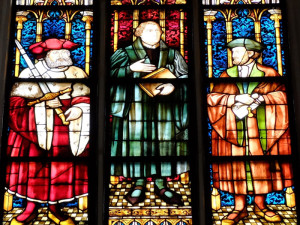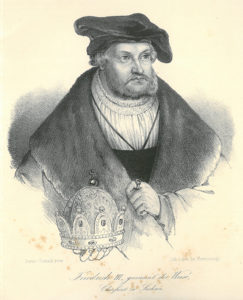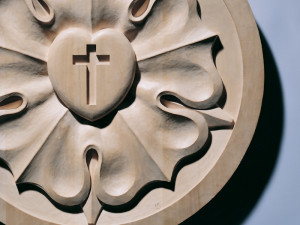by Rev. Aaron Moldenhauer
 Election day in the United States is near, providing a good occasion to consider temporal authority. Since the twentieth century, Lutherans have spoken about a “two-kingdoms” doctrine to work out the relationship between church and state.[1] Martin Luther, living before this vocabulary developed, worked with concepts of “two governments” or “two authorities.” When he wrote about church and state, he categorized them as “estates” rather than “kingdoms.” As we approach election day, Luther’s writings on temporal authority remind us that temporal authorities in the state are appointed to maintain peace.
Election day in the United States is near, providing a good occasion to consider temporal authority. Since the twentieth century, Lutherans have spoken about a “two-kingdoms” doctrine to work out the relationship between church and state.[1] Martin Luther, living before this vocabulary developed, worked with concepts of “two governments” or “two authorities.” When he wrote about church and state, he categorized them as “estates” rather than “kingdoms.” As we approach election day, Luther’s writings on temporal authority remind us that temporal authorities in the state are appointed to maintain peace.
When Luther writes about two kingdoms in On Temporal Authority, he writes of a kingdom of God and a kingdom of the world. In this text Luther writes that believers, living under Christ, belong to the kingdom of God. Those who are not Christians belong to the kingdom of the world.[2] Luther would have Christians live in such a way that satisfies both of these kingdoms, serving God inwardly and the neighbor outwardly.[3] For Luther a Christian lives in God’s kingdom and under temporal authority.
In On Temporal Authority Luther locates temporal government within the kingdom of the world. The kingdom of the world needs laws to uphold peace, so God establishes a government within that kingdom. Luther speaks of this government in terms of “temporal authority,” “temporal government,” “civil law,” or “the sword.”[4] The temporal government is to preserve external peace and to prevent evil deeds. It does not make anyone righteous in God’s eyes.[5] Luther bids Christians to live under temporal government for the good of the neighbor. This means that the Christian pays taxes, honors those in authority, and serves and helps the governing authority.[6]

For Luther, “governing authority” was a concrete term, meaning particular individuals holding offices. Luther’s focus on concrete individual authorities is evident in his explanation of the fourth commandment in the Large Catechism. Luther’s discussion here is about the people God has placed in authority and so given responsibility to care for and serve those subject to their authority.[7] Luther thinks of governing authorities as concrete individuals because he lived before the development of modern nation-states with institutionalized bureaucracies. Temporal authorities for Luther were primarily nobles who inherited and wielded the civil sword.[8] This means that Luther’s specific counsels to individuals in and under temporal government is written to advise Christians on how they relate to magistrates, and to advise princes and nobility in carrying out their vocations.[9]
The concrete nature of Luther’s view of authority is also evident when Luther describes the temporal government as an estate. Luther lists three orders or estates that God has instituted in this world: church, home, and state. Church and home are instituted in the Garden of Eden, but the state arises only later in order to keep sin in check.[10] When Luther speaks of “estates,” he means offices in which people serve and the people holding those offices. His conversation on three estates focuses on the concrete office-holders: pastors, parents, princes, etc.[11] Luther’s view of the state consists of God’s authority given to individual rulers to preserve peace and prevent wickedness.
What would Luther say about temporal authorities and elections in the United States? Since many of Luther’s specific counsels (beyond general principles of living under temporal government) address situations dealing with particular authorities he knew from the Holy Roman Empire (princes, dukes, emperor, city councils, etc.), one needs to be careful in applying those counsels directly to the different authorities that make up the government of the United States. Perhaps a better approach is to identify  what scriptural passages and doctrines Luther used in his works dealing with political matters in the sixteenth century and ask what those passages say about temporal authority in the United States, since these passages apply to Christians of all time. Working from passages like Romans 13, Luther saw civil government as God’s instrument to maintain peace. This passage is a call to government to maintain peace and not to abuse its power. It is a call for citizens to honor and support the authorities God has placed over us.
what scriptural passages and doctrines Luther used in his works dealing with political matters in the sixteenth century and ask what those passages say about temporal authority in the United States, since these passages apply to Christians of all time. Working from passages like Romans 13, Luther saw civil government as God’s instrument to maintain peace. This passage is a call to government to maintain peace and not to abuse its power. It is a call for citizens to honor and support the authorities God has placed over us.
The Rev. Aaron Moldenhauer is associate pastor of Zion Lutheran Church, Beecher, Ill.
[1] Bernhard Lohse identifies Karl Barth as the inventor of the term “two-kingdoms doctrine.” For a discussion of its relation to Luther’s thought, see Lohse’s book Martin Luther’s Theology, trans. Roy A. Harrisville (Minneapolis: Augsburg Fortress, 1999), 154–155, 314–316.
[2] LW 45:88–91. These two kingdoms are related to Augustine’s two cities in his influential City of God.
[3] LW 45:94–95.
[4] The Augsburg Confession, Article 28, also speaks of two “authorities” but not two “kingdoms” when articulating the roles of church and state.
[5] LW 45:88–92.
[6] LW 45:93–94.
[7] Paul McCain et al., Concordia The Lutheran Confessions: A Reader’s Edition to the Book of Concord, 2nd ed. (St. Louis: Concordia Publishing House, 2006), 370–378.
[8] Hence Luther’s 1520 appeal To the Christian Nobility, addressed to the temporal authorities (Christian nobility) in the Holy Roman Empire. Luther was familiar with free cities within the Holy Roman Empire that were governed by councils, but he himself lived under the princes of Electoral Saxony.
[9] Robert von Friedeburg, “Church and State in Lutheran Lands, 1550-1675,” in Brill’s Companion to the Christian Tradition: Lutheran Ecclesiastical Culture, 1550-1675, ed. Robert Kolb (Leiden and Boston: Brill Academic Publishers, 2008), 361-362.
[10] LW 1:103–104.
[11] LW 37:364–365.
